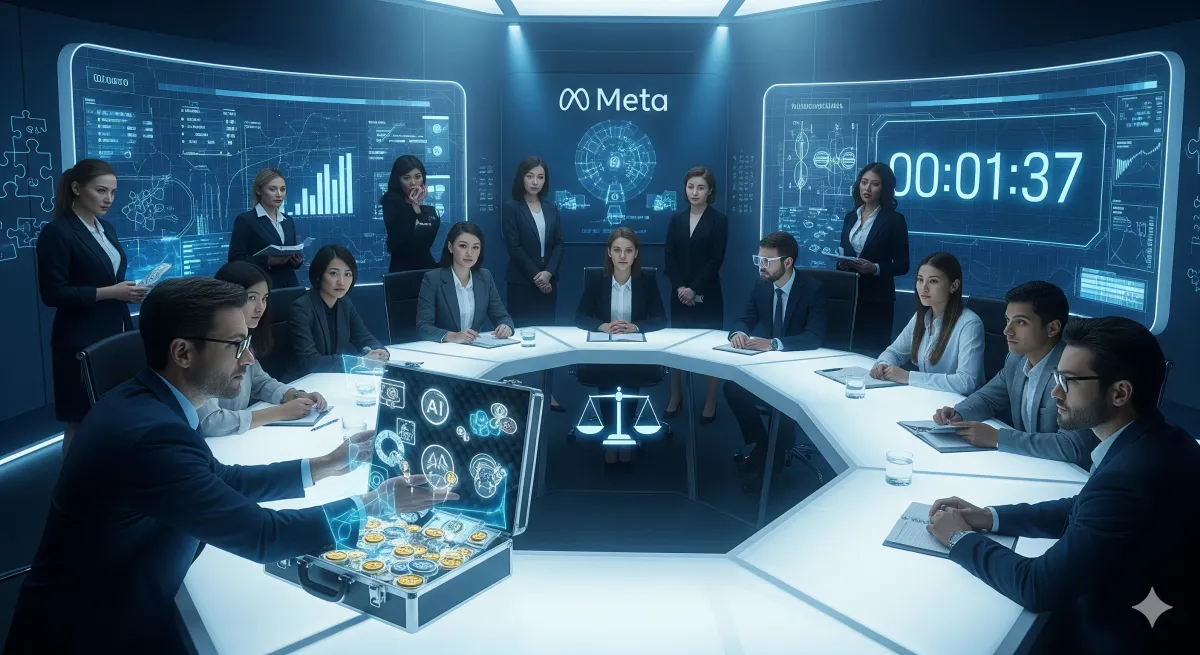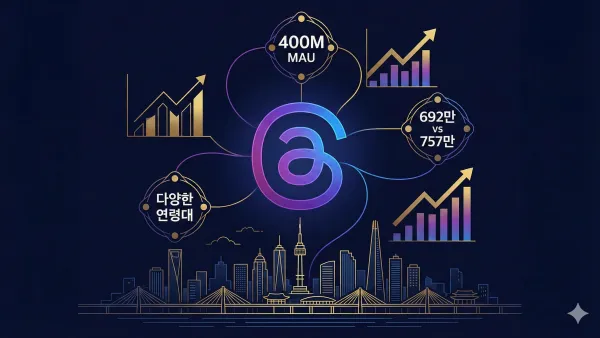3 Pitfalls of Talent Strategy in the AI Era: The Paradox of Corporate Innovation Seen Through Meta's Case
Meta’s rush to secure AI talent exposes three key innovation traps: the illusion of speed, fairness dilemmas in pay gaps, and overreliance on self-integration. Real innovation comes not from money alone, but from culture and collaboration.

Meta's aggressive pursuit of AI talent is more than just a hiring story. It's a living case study that exposes the fundamental dilemmas of corporate innovation strategy in the AI era. From Mark Zuckerberg personally offering multi-million dollar compensation packages¹ to reorganizing teams and shifting to external partnerships² within months, this process starkly reveals three key traps modern companies face.
Pitfall 1: The Illusion of Speed — The Fantasy of a "Quick Fix"
Meta's first mistake was the illusion that time could be bought with money. Zuckerberg believed that by bringing in key researchers from OpenAI, Meta could immediately gain a competitive edge. Sam Altman's publicly mentioned $100 million signing bonus³ symbolizes this impatience.
However, innovation is about creating a culture, not just transplanting knowledge. The reason why at least three researchers, including Ethan Knight and Rishabh Agarwal, returned to OpenAI within a month⁴ wasn't just about money. It was because Meta lacked the cultural environment where researchers could truly thrive.
Strategic Lesson
In the era of digital transformation, one of the most common mistakes companies make is equating 'talent' with 'immediate results.' But true innovation comes from the collective intelligence of a team, not just individual genius.
Pitfall 2: The Dilemma of Fairness — The Compensation Gap
Meta's second pitfall was the compensation disparity between new hires and existing employees. Existing researchers witnessed the significant pay differences with newly recruited talent, leading to heightened internal tension⁵. This wasn't merely an HR issue but a structural problem that eroded the organization's DNA.
From a legal philosophy perspective, this is a classic dilemma of distributive justice. Is it fair to offer different compensation to people who create the same value? Meta failed to find a balance between market logic (the scarcity of new talent) and organizational logic (the contributions of existing employees).
More critically, this dual structure fostered internal factions. The invisible boundary between
"Meta Originals" and "external recruits" hindered collaboration and slowed down the pace of innovation.
Strategic Lesson
Talent investment for innovation should be a positive-sum game, not a zero-sum game. Companies need to build systems where new talent acquisition can also boost the motivation of existing employees.
Pitfall 3: The Illusion of Self-Reliance — The Obsession with Vertical Integration
The most fundamental pitfall was the obsession with vertical integration. Zuckerberg attempted to solve everything related to AI internally through Meta Superintelligence Labs (MSL). However, within just 50 days, this organization had to be dismantled into four teams⁶, eventually leading to reliance on external capabilities through a partnership with Midjourney⁷.
This is a déjà vu of the metaverse. Just as the attempt to build the VR/AR ecosystem alone failed, resulting in over $6 billion in losses since 2020⁸, Meta repeated the same mistake with AI. Modern technological innovation is no longer achieved through vertical integration. Strategic alliances and ecosystem building are key.
The New York Times reported on Meta considering the adoption of "third-party AI models"⁹, a lesson Meta learned belatedly. It’s more efficient to collaborate with optimal partners than to try to build everything in-house.
Strategic Lesson
Competitiveness in the AI era depends on balancing Make vs. Buy vs. Partner. It requires the wisdom to internalize core competencies while securing complementary technologies through strategic alliances.
Practical Lessons from the Meta Case
Three Principles of Talent Strategy
First, cultural fit. Money alone cannot secure true commitment. Andrew Tulloch famously turned down a $1.5 billion offer from Meta over six years¹⁰, valuing the mission and creative freedom of Thinking Machines Lab more highly.
Second, internal equity. New hires should not undermine existing teams. At Meta, pay disparities between newcomers and existing employees fueled internal conflict and weakened organizational cohesion.
Third, sustainability. Long-term development matters more than one-off hires. Many of Meta’s recruits left within months, highlighting the failure to prioritize sustainable talent growth.
Redefining Innovation Strategy
Modern companies must shift from Complete Control to Smart Collaboration. Meta’s partnership with Midjourney was not a defeat, but a pragmatic choice. Rather than internalizing everything, focusing on core strengths while collaborating with top partners in complementary areas is far more effective.
Restructuring the organization four times in six months¹¹ was a clear design flaw. In the AI era, organizations should prioritize adaptability over rigidity, and networks over hierarchy. Frequent reorganizations only create instability and confusion among employees.
Beyond the Paradox of Innovation
It is too early to judge whether Meta’s experiment will serve as valuable data or irreversible loss. AI innovation is not merely a technological challenge but a systemic issue that integrates organizational culture, talent philosophy, and collaboration strategy.
Zuckerberg’s vision of “Personal Superintelligence”¹² was ambitious, but the way it was pursued reflected fundamental misjudgments. Companies navigating the AI era must learn from Meta’s lessons: choose direction over speed, access over ownership, and collaboration over control. Sustainable innovation is not bought with money—it is built through culture. Whether Meta’s frenzy becomes a learning opportunity or an irreparable blow will depend on its next steps.
Q&A
Q: What was Meta’s biggest mistake?
A: Believing that time could be bought with money. Meta assumed poaching top OpenAI researchers would instantly secure competitiveness, but true innovation comes from building culture, not transplanting knowledge.
Q: What conflicts arose within Meta?
A: Severe tensions from pay disparities. Existing researchers witnessed newcomers earning far higher salaries, which intensified organizational conflict and undermined trust.
Q: Why did Meta Superintelligence Labs (MSL) fail?
A: The limits of vertical integration. Within 50 days, MSL had to be dismantled into four teams, ultimately forcing reliance on external partners like Midjourney.
Q: What can other companies learn from Meta?
A: First, prioritize cultural fit. Andrew Tulloch rejected $1.5 billion for mission and freedom. Second, maintain internal fairness. Third, invest in long-term talent development instead of short-term hires.
Q: How should organizations adapt in the AI era?
A: Shift from Complete Control to Smart Collaboration. Emphasize adaptability over rigidity, and networks over hierarchy.
Q: What lies ahead for Meta?
A: It is too soon to tell. The experiment could be a valuable learning opportunity or a damaging misstep. What’s certain is that sustainable innovation is built through culture, not money.
Reference
- Fortune - Meta's $100m signing bonuses for OpenAI staff are just the latest sign of extreme AI talent war
- Bloomberg - Meta Restructures AI Group Again in Pursuit of Superintelligence
- Inc. - Meta's AI Talent War Had Reports of $100 Million Bonuses
- AITopics - Researchers Are Already Leaving Meta's New Superintelligence Lab
- AI Invest - Meta AI Restructures to Pursue Superintelligence Amidst Fierce Competition and Internal Tensions
- WinBuzzer - Meta Overhauls AI Division Again, Splitting New Superintelligence Lab into Four Groups
- TechCrunch - Meta partners with Midjourney on AI image and video models
- CNBC - Meta's Reality Labs posts $5 billion loss in fourth quarter
- PC Gamer - Looks like AI could be the new Metaverse as CEO Mark Zuckerberg will reportedly 'downsize' Meta Superintelligence Labs
- Entrepreneur - Mark Zuckerberg Reportedly Made One Person a $1.5 Billion Job Offer — and Was Rejected
- Gizmodo - Is Meta's Superintelligence Overhaul a Sign Its AI Goals Are Struggling?
- CNBC - Mark Zuckerberg announces creation of Meta Superintelligence Labs




